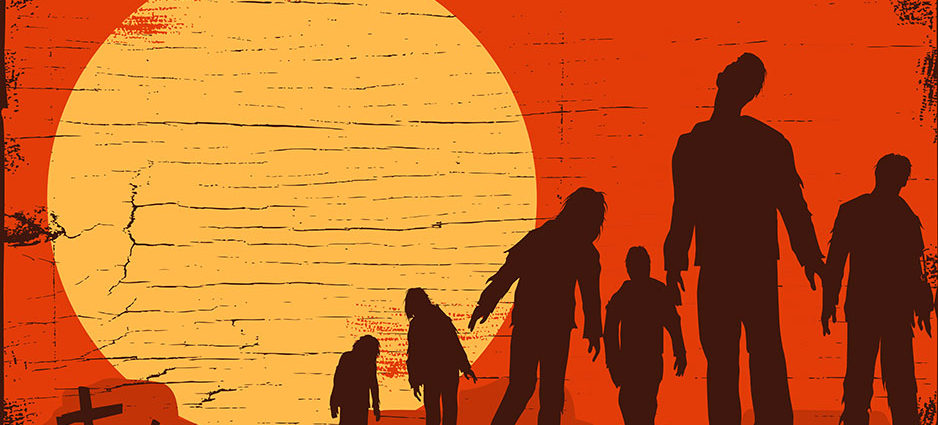CDC CENTER FOR DISEASE CONTROL: ZOMBIE PREPAREDNESS (IS THIS SUPPOSED TO BE A JOKE?)

Wonder why zombies, zombie apocalypse, and zombie preparedness continue to live or walk dead on a CDC web site? As it turns out what first began as a tongue-in-cheek campaign to engage new audiences with preparedness messages has proven to be a very effective platform. We continue to reach and engage a wide variety of audiences on all hazards preparedness via “zombie preparedness”.
The CDC says the first thing you need to do is to prepare an emergency kit. This includes things such as water, food and other supplies to get you through the first couple of days before you can locate a zombie-free refugee camp, or in the event of a natural disaster, it will buy you some time until you are able to make your way to an evacuation shelter or until utility lines are restored.
Below are a few items you should include in your kit:
- Water (1 gallon per person per day)
- Food (stock up on non-perishable items that you eat regularly)
- Medications (this includes prescription and non-prescription meds)
- Tools and Supplies (utility knife, duct tape, battery-powered radio, etc.)
- Sanitation and Hygiene (household bleach, soap, towels, etc.)
- Clothing and Bedding (a change of clothes for each family member and blankets)
- Important documents (copies of your driver’s license, passport, and birth certificate to name a few)
- First Aid supplies (although you’re a goner if a zombie bites you, you can use these supplies to treat basic cuts and lacerations that you might get during a tornado or hurricane)
For a full list, visit the CDC Emergency page.
Once you’ve made your emergency kit, the CDC recommends that families gather together to come up with an emergency plan.Are you prepared if disaster strikes?
“This includes where you would go and who you would call if zombies started appearing outside your doorstep,” the CDC informs. “You can also implement this plan if there is a flood, earthquake, or another emergency.”
- Identify the types of emergencies that are possible in your area. Besides a zombie apocalypse, this may include floods, tornadoes, or earthquakes. If you are unsure, contact your local Red Cross chapter for more information.
2. Pick a meeting place for your family to gather in case zombies invade your home … or if your town evacuates because of a hurricane. Pick one place right outside your home for sudden emergencies and one place outside of your neighborhood in case you are unable to return home right away.
3. Identify your emergency contacts. Make a list of local contacts such as the police, fire department, and your local zombie response team. Also, identify an out-of-state contact that you can call during an emergency to let the rest of your family know you are OK.
4. Plan your evacuation route. When zombies are hungry, they won’t stop until they get food (i.e., brains), which means you need to get out of town fast. Plan where you would go and multiple routes you would take ahead of time so that the flesh eaters don’t have a chance. This is also helpful when natural disasters strike and you have to take shelter fast.

According to CDC officials, if zombies ever did start roaming the streets, the agency would conduct an investigation much like one for any other disease outbreak. The CDC would provide technical assistance to cities, states, or international partners dealing with a zombie infestation. This assistance might include consultation, lab testing and analysis, patient management and care, tracking of contacts, and infection control (including isolation and quarantine).
“An investigation of this scenario would likely seek to accomplish several goals: determine the cause of the illness, the source of the infection/virus/toxin, learn how it is transmitted and how readily it is spread, how to break the cycle of transmission and thus prevent further cases, and how patients can best be treated,” the CDC informs. “Not only would scientists be working to identify the cause and cure of the zombie outbreak, but CDC and other federal agencies would send medical teams and first responders to help those in affected areas.”
To learn more about what CDC does to prepare for and respond to emergencies of all kinds, visit http://emergency.cdc.gov/cdc/orgs_progs.asp.
And to learn more about how you can prepare for and stay safe during an emergency visit, http://emergency.cdc.gov/.
You can also join the CDC Zombie Task Force. The CDC Foundation, a non-profit partner of the CDC is offering Zombie Task Force T-shirts. Proceeds go to disaster relief efforts and other important health programs. Get yours before they’re gone.
